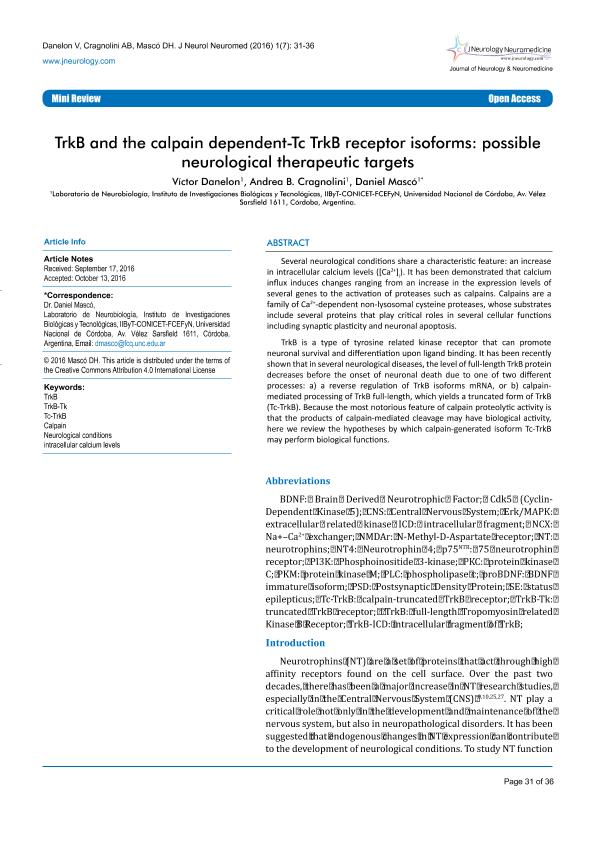Mostrar el registro sencillo del ítem
dc.contributor.author
Danelon, Víctor

dc.contributor.author
Cragnolini, Andrea Beatriz

dc.contributor.author
Masco, Daniel Hugo

dc.date.available
2018-04-18T13:53:39Z
dc.date.issued
2016-12
dc.identifier.citation
Danelon, Víctor; Cragnolini, Andrea Beatriz; Masco, Daniel Hugo; TrkB and the calpain dependent-Tc TrkB receptor isoforms: possible neurological therapeutic targets; Sciaccess Publishers; Journal of Neurology and Neuromedicine; 1; 7; 12-2016; 31-36
dc.identifier.issn
2572-942X
dc.identifier.uri
http://hdl.handle.net/11336/42424
dc.description.abstract
Several neurological conditions share a characteristic feature: an increase in intracellular calcium levels ([Ca2+]i). It has been demonstrated that calcium
influx induces changes ranging from an increase in the expression levels of several genes to the activation of proteases such as calpains. Calpains are a family of Ca2+-dependent non-lysosomal cysteine proteases, whose substrates include several proteins that play critical roles in several cellular functions including synaptic plasticity and neuronal apoptosis.
TrkB is a type of tyrosine related kinase receptor that can promote neuronal survival and differentiation upon ligand binding. It has been recently shown that in several neurological diseases, the level of full-length TrkB protein decreases before the onset of neuronal death due to one of two different processes: a) a reverse regulation of TrkB isoforms mRNA, or b) calpainmediated processing of TrkB full-length, which yields a truncated form of TrkB (Tc-TrkB). Because the most notorious feature of calpain proteolytic activity is that the products of calpain-mediated leavage may have biological activity, here we review the hypotheses by which calpain- generated isoform Tc-TrkB may perform biological functions.
dc.format
application/pdf
dc.language.iso
eng
dc.publisher
Sciaccess Publishers
dc.rights
info:eu-repo/semantics/openAccess
dc.rights.uri
https://creativecommons.org/licenses/by-nc-sa/2.5/ar/
dc.subject
Trkb
dc.subject
Trkb-Tk
dc.subject
Tc-Trkb
dc.subject
Calpain
dc.subject
Neurological Conditions
dc.subject
Interecellular Calcium Levels
dc.subject.classification
Otras Ciencias Biológicas

dc.subject.classification
Ciencias Biológicas

dc.subject.classification
CIENCIAS NATURALES Y EXACTAS

dc.title
TrkB and the calpain dependent-Tc TrkB receptor isoforms: possible neurological therapeutic targets
dc.type
info:eu-repo/semantics/article
dc.type
info:ar-repo/semantics/artículo
dc.type
info:eu-repo/semantics/publishedVersion
dc.date.updated
2018-04-04T14:42:09Z
dc.journal.volume
1
dc.journal.number
7
dc.journal.pagination
31-36
dc.journal.pais
Estados Unidos

dc.description.fil
Fil: Danelon, Víctor. Consejo Nacional de Investigaciones Científicas y Técnicas. Centro Científico Tecnológico Conicet - Córdoba. Instituto de Investigaciones Biológicas y Tecnológicas. Universidad Nacional de Córdoba. Facultad de Ciencias Exactas, Físicas y Naturales. Instituto de Investigaciones Biológicas y Tecnológicas; Argentina
dc.description.fil
Fil: Cragnolini, Andrea Beatriz. Consejo Nacional de Investigaciones Científicas y Técnicas. Centro Científico Tecnológico Conicet - Córdoba. Instituto de Investigaciones Biológicas y Tecnológicas. Universidad Nacional de Córdoba. Facultad de Ciencias Exactas, Físicas y Naturales. Instituto de Investigaciones Biológicas y Tecnológicas; Argentina
dc.description.fil
Fil: Masco, Daniel Hugo. Consejo Nacional de Investigaciones Científicas y Técnicas. Centro Científico Tecnológico Conicet - Córdoba. Instituto de Investigaciones Biológicas y Tecnológicas. Universidad Nacional de Córdoba. Facultad de Ciencias Exactas, Físicas y Naturales. Instituto de Investigaciones Biológicas y Tecnológicas; Argentina
dc.journal.title
Journal of Neurology and Neuromedicine
dc.relation.alternativeid
info:eu-repo/semantics/altIdentifier/url/http://www.jneurology.com/articles/trkb-and-the-calpain-dependenttc-trkb-receptor-isoforms-possible-neurological-therapeutic-targets-neuromed-1-1076.php
Archivos asociados
